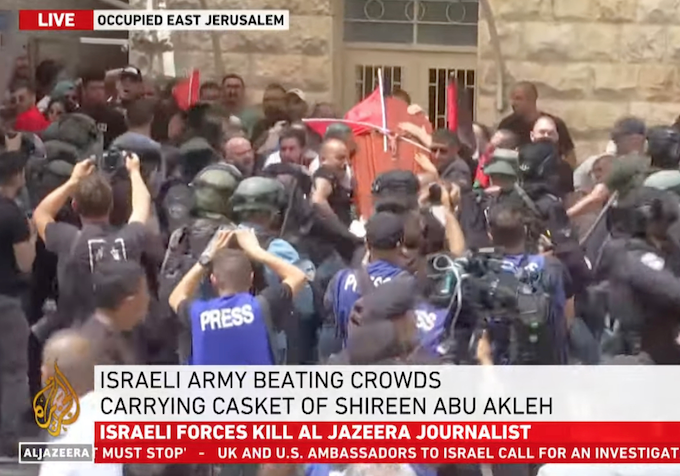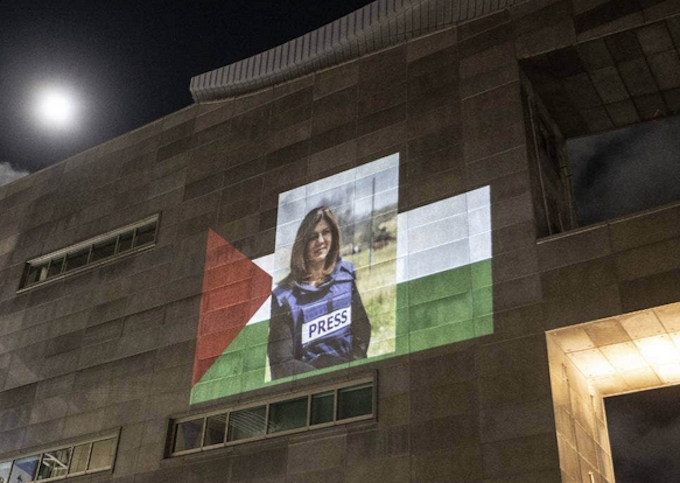The global response to the killing of Al Jazeera journalist Shireen Abu Akleh. Video: Al Jazeera
COMMENTARY: By Gavin Ellis of Knightly Views
Nothing justifies the killing of Al Jazeera journalist Shireen Abu Akleh and the wounding of her colleague Ali al-Samoudi during an Israeli raid on Jenin in the Occupied West Bank. Nothing.
I believe the renowned reporter died at the hands of Israeli armed forces and that she was deliberately targeted because she was a journalist, easily identified by the word PRESS on the flak jacket and helmet that did not protect her from the shot that killed her. Her wounded colleague was identically dressed.
I am left in no doubt about the culpability of the Israeli Defense Forces (IDF) on a number of grounds.
- READ MORE: Behind the tears for Shireen, more evidence of Israel’s daily crimes with impunity
- Gallery: Nakba Day in Auckland – protesting against Israel’s ‘ethnic cleansing’
- Guerilla Palestine protest at Te Papa after mayor blocks council building use
- Other Shireen Abu Akleh reports
Several eyewitnesses, including an Agence France-Presse photographer and another Al Jazeera staffer, were adamant that there was no shooting from Palestinians near the scene of the killing. Shatha Hanaysha, the Al Jazeera journalist who had been standing next to Abu Akleh against a high wall when firing broke out, stated they were deliberately targeted by Israeli troops.
Israeli spokesmen who initially laid the blame on Palestinian militants became more equivocal in the face of the eyewitness accounts, although they would go no further than saying she could have been accidentally shot from an armoured vehicle by an Israeli soldier.
That is about as close to an admission of guilt as the IDF is likely to get.
However, perhaps the strongest evidence of IDF culpability is the fact that the killing of Abu Akleh is part of a pattern of targeting journalists. Reporters Without Borders — which has called for an independent international investigation of the death that it says is a violation of international conventions that protect journalists — says two Palestinian journalists were killed by Israeli snipers in 2018 and since then more than 140 journalists have been the victims of violations by the Israeli security forces.
30 journalists killed since 2000
By its tally, at least 30 journalists have been killed since 2000.
Of course, those deaths are but one consequence of the IDF’s disproportionate response — in terms of the number of victims — to actions by Palestinian militants over the occupation of the West Bank. Since the present Israeli government took office last year, 76 Palestinians have died at the hands of Israeli forces.
There has been condemnation of such deaths, particularly when they include a number of children. So the reaction to the killing of Shireen Abu Akleh was sadly predictable. In other circumstances the outcry would dissipate and Israeli forces would continue to carry out their government’s wishes.
However, three things may make the condemnation louder, longer and more effective.
First was the fact that, although she was born in Jerusalem, she was a United States citizen. This could well explain the US Administration’s statement condemning the killing and its willingness to back a similarly reproachful UN Security Council resolution.
The second factor was that, although a Palestinian, Abu Akleh was not a Muslim. She was raised in a Christian Catholic family. It may not be a particularly becoming trait but the ability of the West to identify with a victim affects the way in which it reacts.
However, it is the third factor that may have the most telling effect on the long-term consequences of her death. I am referring to the desecration of her funeral by baton-wielding armed Israeli police.
Pallbearers assaulted by police
The journalist’s coffin was carried in procession from an East Jerusalem hospital to the Cathedral of the Annunciation of the Virgin in the Christian Quarter of the Old City where a service was held before burial in a cemetery on the Mount of Olives. However, shortly after the pallbearers left the hospital the procession — waving Palestinian flags and chanting — was assaulted by police.

Mourners were hit with batons, stun grenades were detonated, and a phalanx of armed police in riot gear advanced on the coffin. The procession scattered in disarray and, as the pallbearers tried to avoid the police action, the coffin tilted almost vertical and was in danger of falling to the road.
At that point, an Al Jazeera journalist providing commentary on live coverage of the funeral said an an anguished voice: “Oh my God. Such disrespect for the dead, for those mourning the dead. How is that a security threat? How is that disorderly? Why does it require this kind of reaction, this level of violence on the part of the Israelis?”
The horrifying scene was captured by international media and shown around the world
“The Israeli army is asking people if they are Christian or Muslim. If you’re Muslim you weren’t allowed in.” – @ajimran
Israeli occupation forces are attacking Palestinians during the funeral of killed Al Jazeera journalist Shireen Abu Akleh. pic.twitter.com/Xq3VkeOCqn
— Al Jazeera English (@AJEnglish) May 13, 2022
Why did the police act as they did? Apparently because it is illegal to display the Palestinian flag and chant Palestinian slogans. Even after Abu Akleh’s coffin was transferred to a vehicle, police ran alongside to tear Palestinian flag from the windows.
The message was clear: There was no contrition on the part of Israeli authorities for the death of the Al Jazeera journalist. The justification for the police action was pathetic. There were lame excuses that stones had been thrown at them. In other words, it was business as usual.
That may not be the way the world sees it. Nor, indeed, the way it may be seen by many ordinary Israelis who would have been affronted by the indignity shown to the remains of a widely respected woman who died doing her job.
‘Time for some accountability?’
Yaakov Katz, the editor of the Jerusalem Post, an English-language Israeli newspaper, said on Twitter: “What’s happening at Abu Akleh’s funeral is terrible. This is a failure on all fronts.” In a later message he asked: “Is it not time for some accountability?”
The targeting of journalists aims to intimidate and to prevent them from bearing witness, particularly where authorities have something to hide. That is why, for example, we have seen seven journalists killed in Ukraine, 12 of their colleagues injured by gunfire, and multiple reports of clearly identified journalists coming under fire from Russian forces.
One might have thought the international community — and in particular Israel’s close friend the United States — would have put significant pressure on Tel Aviv to cease such intimidation a year ago after Israeli aircraft bombed the Gaza City building that was home to various media organisations including Al Jazeera and the US wire service Associated Press.
Israel claimed, without any evidence and contrary to AP’s own knowledge, that the building was being used by Hamas, the Palestinian nationalist organisation.
Associated Press chief executive Gary Pruitt said after that attack that “the world will know less about what is happening in Gaza because of what happened today”. Aidan White, founder of the Ethical Journalism Network described the bombing as a “catastrophic attempt to shut down media, to silence criticism, and worst of all, to create a cloak of secrecy”.
That, no doubt, was what Tel Aviv intended.
Yet there were no recriminations sufficient to change the course Tel Aviv was on. As the killing of Shireen Abu Akleh so tragically illustrates, Israel has continued its policy of intimidation and violence against journalists.
Sooner or later, it will come to realise that such actions diminish a government in the eyes of the world. The death of Abu Akleh and the indignity shown to her remains have added significantly to the damage to its reputation.
Dr Gavin Ellis holds a PhD in political studies. He is a media consultant and researcher. A former editor-in-chief of The New Zealand Herald, he has a background in journalism and communications — covering both editorial and management roles — that spans more than half a century. Dr Ellis publishes a website called Knightly Views where this commentary was first published and it is republished by Asia Pacific Report with permission.














































